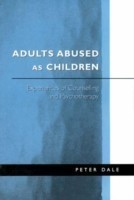`This is a useful book that offer4s insights into outcomes for a sample of adults who sought help for the effects of their childhood abuse and the affect of the personal qualities and approaches of their therapists. It traverses some controversial ground and because it brings to light issues that are often on the basked labelled "too hard" should be compulsory reading for all the therapists working in this field′ -
International Social Work
`This book is an extensive overview of practice-based research on therapy for adults who were abused as children, physically, sexually or emotionally.... Peter Dale looks in detail at the lessons to be learnt from people′s experiences of therapy... a relief to find such a comprehensive well-researched book on the subject from a psychotherapeutic perspective.... Its wider relevance is that we (society, therapists and service-planners in particular) must learn from people who have been abused as children, so that appropriate and supportive services can be set up′ - Transformations, The PCSR Journal
`I believe this book - based on Peter Dale′s research into the experience of 53 clients - is of profound importance to practising counsellors, trainers and researchers....I recommend this carefully designed and executed piece of research to all BAC readers′ - Mary Berry Senior Lecturer in Counselling, University of Manchester
′The author has created interesting and thought-provoking arguments that provide a balanced analysis of abuse therapy, in particular Repression, Dissociation and False Memory Retrieval′ - Clare Young, The Journal of Critical Psychology, Counselling and Psychotherapy
This enlightening book brings together the experiences of both clients and therapists who receive and provide help for the effects of childhood abuse. The book consolidates existing knowledge about child abuse and psychotherapeutic approaches to give an integrated account of counselling and therapy as it relates to adults abused as children.
Part One examines research in the fields of child abuse and psychotherapy, reviewing historically changing attitudes towards childhood abuse and the consequences of cultural context on approaches to treatment. Part Two reviews the testimonies of the therapeutic process from over 50 clients and therapists, including therapists who were themselves abused as children. These testimonies form a basis for the discussion of specific issues, such as becoming a client, talking about abuse and what happens when things go wrong in therapy. Part Three tackles the controversy surrounding `recovered memory′ and child abuse, and assesses the implications for the future direction of counselling and therapy.

















